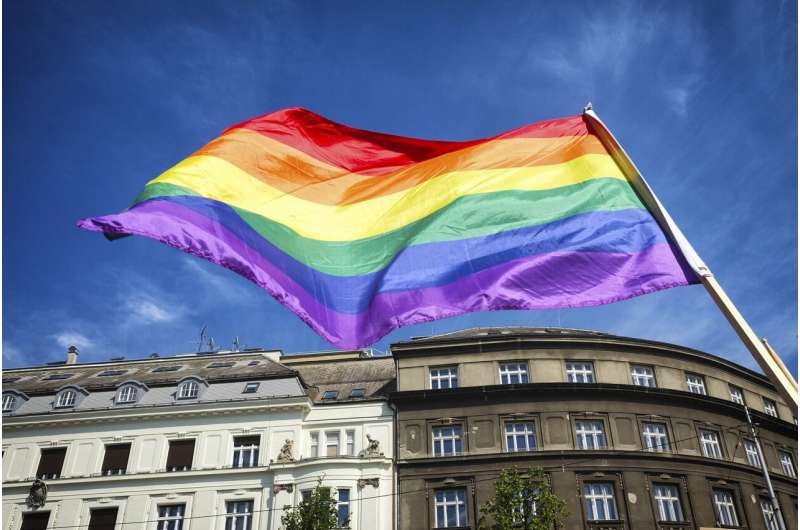Ten ways to support 2SLGBTQIA+ youth this pride month

June is Pride Month in many parts of the world.
It commemorates the that amplified an already growing social movement to support gay, lesbian, bisexual and trans rights.
After , a gay bar in Greenwich Village, and neighborhood allies took to the streets in protest for six days.
Pride Month reminds us of where we've come from and what progress has been made, and it is an opportunity to take stock of the struggles that remain.
Anti-2SLGBTQIA+ sentiments
Since Pride Month last year, Canada has seen an intensification of stemming from and emboldened by conservative provincial governments. , and have announced new policies that target 2SLGBTQIA+ communities, and youth in particular.
Access to inclusive education, gender-affirming health care and sports has been rolled back, leaving 2SLGBTQIA+ youth even more vulnerable to homophobia and transphobia. In addition, Indigenous and racialized 2SLGBTQIA+ youth often contend with the intersecting prejudice of racism and anti-2SLGBTQIA+ sentiments.
In response, the federal government recently announced to support Pride organizations and festivals amid increased hostility.
Many , still figuring out how to navigate a society that isn't always accepting. Despite this, Pride—and the stories about it—typically center 2SLGBTQIA+ adults.
So here are 10 concrete ways to support 2SLGBTQIA+ youth during Pride and beyond.
1. Create and protect 2SLGBTQIA+ affirming schools
2SLGBTQIA+ affirming schools are essential for the well-being of two-spirit, queer and trans youth. That means ensuring youth have access to gender-neutral bathrooms, respecting pronouns and names and not requiring , and having robust and .
Parents, principals and teachers, including their unions, should continue to .
Far-right groups like aspire to have a slate of candidates in the 2025 municipal elections. As a parent, you can resist these harmful takeovers by campaigning to be elected to your local school board and becoming actively involved in parent councils.
2. Educate yourself about gender-affirming health care
As gender-affirming health care faces , it is important for the public to educate themselves about these issues. and . Amplify the voices of health organizations like the that use scientific evidence as the basis for their public policy advocacy.
3. Improve access to inclusive sports and leisure
Sports and leisure are associated with . Inclusive sports environments generate .
Like the sporting organization , local leaders, advocates, coaches and parents can support 2SLGBTQIA+ youth by pushing back against trans exclusion to ensure all youth can benefit.
4. Support 2SLGBTQIA+ youth artists and musicians
Music and art can be important mediums for queer youth's . Creating music and art can create feelings of safety, and an opportunity to imagine possible futures. During Pride month, support the young artists in your life by attending their shows or buying their art.
5. Support 2SLGBTQIA+ affirming spaces for youth
2SLGBTQIA+ affirming spaces for youth have been targeted in recent years. This includes and . This Pride, provide support for 2SLGBTQIA+ affirming spaces such as youth drag events, and summer camps for .
6. Amplify 2SLGBTQIA+ role models
Young people use a variety of media to . Support youth by amplifying 2SLGBTQIA+ role models—those young people see in real life and those in books and media.
Research shows that having increases the mental and physical well-being of gender and sexual-diverse individuals.
Many public libraries have featuring books for all ages. Given the pressure to , it is even more important to read these stories and support 2SLGBTQIA+ authors.
7. Donate to organizations advocating for 2SLGBTQIA+ youth
There are many running programs and advocating for 2SLGBTQIA+ youth. 2SLGBTQIA+ organizations and raise money to support the legal fight against policies that threaten to strip rights from 2SLGBTQIA+ youth. Canadian pop duo Tegan and Sara raising funds for queer justice by supporting grassroots organizations and activists.
8. Create and amplify opportunities for 2SLGBTQIA+ celebration and joy
Supporting 2SLGBTQIA+ youth means going beyond simply removing physical or legal barriers to inclusion. It also means creating and amplifying opportunities for celebration and joy. Finding a supportive community of people where you can be yourself can be a .
Research suggests connecting with other members of the 2SLGBTQIA+ community through celebratory events like can improve .
9. Speak out against hate and discrimination
The last few years have , and discrimination against the 2SLGBTQIA+ community. Now is the time to use the power you have to speak out.
Learn how to become a stronger ally. Intervene in conversations that are anti-2SLGBTQIA+ or perpetuate .
2SLGBTQIA+ youth have asked adults to who advocate for anti-2SLGBTQIA+ legislation.
There are to help you become more informed about the evidence that debunks anti-2SLGBTQIA+ policy proposals. Read them, sign and share petitions, and join actions big and small (like ).
10. Listen to 2SLGBTQIA+ youth voices
Allies need to listen more than they speak. Now is the time to amplify the voices of and lived experiences—youth know what they need from adults.
Check out results from large-scale surveys of 2SLGBTQIA+ youth such as this guided by Youth Advisory Groups or the in the United States. This study provides a wealth of evidence about how to offer support to queer youth based on 18,000 responses.
This Pride month, come for the celebration but continue to show up to support 2SLGBTQIA+ youth all year. By taking concrete actions, we can build more inclusive communities and positively impact the lives of 2SLGBTQIA+ youth.
Provided by The Conversation
This article is republished from under a Creative Commons license. Read the .![]()


















